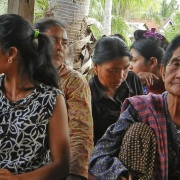Today is World Day to Combat Desertification

Photo Credit: The Express Tribune
The annual observation of World Day to Combat Desertification is underway amid daunting projections, if immediate mitigation measures are ignored.
Desertification, which is caused by ‘land degradation in dry lands’ (not necessarily the creation of deserts), affects one in three people in some way, and costs the world economy US$42 billion annually. The International Union for Conservation of Nature (IUCN) estimates that almost two billion hectares of land in over 110 countries have been seriously degraded.
Land degradation is heightened by population pressure, intensification of agriculture, water-logging and salinity, among other things. Both water-logging and salinity are caused by poor irrigation and drainage, deforestation, overgrazing, soil erosion and poverty.
But the matter of poverty is two fold, as land degradation pose serious implications for efforts to reduce it and hunger worldwide. The developing world, namely Africa, Asia and Latin America, is home to 90% of those most affected— mostly subsistence farmers. This trend will expand the scarcity of arable lands and water resources, which will increase food insecurity for the most vulnerable. This will also raise political tensions over unequal land distribution across the developing world. A few large landholders own disproportionate hectares of land in predominantly arid countries such as Pakistan.
Despite these impending challenges, too few governments have been proactive in informing their citizens. ICTs may be leveraged to improve basic farm extension services to reduce poor soil management, and other agricultural related causes of land degradation. Also, more states should embark on water resources development, water harvesting, well rehabilitation, wildlife restoration and biodiversity maintenance projects to mitigate land desertification and better prepare farmers and others to sustain their livelihoods. The success of any such effort will rest on the degree to which citizens are engaged –the range of ICTs available should certainly be leveraged.
Visit the UNCCD website to learn more about about the day of events.







































